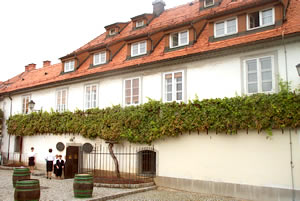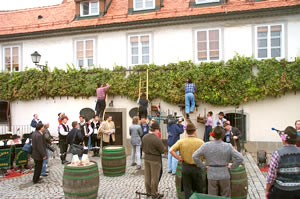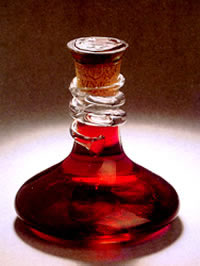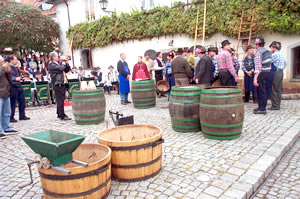The
400-year Old Vine of Maribor
A living monument to wine growing
Slovenia is a wine growing country, producing red and white wines
of high quality, with a history that can be traced back to Celts
and Romans. The documents of the Benedictine Monastery from St.Paul
in Carinthia dating back to 1091, are the first evidence of wine
growing in the area around Maribor, the second largest city of Slovenia,
and the capital of the Štajerska region. Maribor was the centre
of lively wine trade in the Middle Ages, which contributed to its
increasing growth and prosperity.
In the
old city centre, on the banks of the river Drava, the visitor
to Maribor can see an amazing sight - the extraordinary ancient
vine, called by the Mariborcani simply "stara trta"- the Old
Vine. Along the frontage of the long solid two-storey town
house, facing the majestically flowing, serene Drava River.
Planted in the center of the building, near the main entrance
is the grapevine - the visitor will learn that the stalk is
81 cm in circumference in its widest part.
Its great age - 400 years - has been subject to disbelief,
suspicion and investigation. Finally enough evidence was gathered
to leave no doubt. "stara trta" na Lof Maribor will appear
in the next issue of the Guinness Book of Records as the oldest
vine in Europe. The enthusiasts would like it to be the oldest
in the world, but that evidence would be next to impossible
to collect.
|
 The
400 year Old Vine of Maribor
The
400 year Old Vine of Maribor |
|
 Grape
harvest has become a great folk festival
Grape
harvest has become a great folk festival
 The
origins of the wine is guaranteed
The
origins of the wine is guaranteed
by the Maribor seal of the year 1520
and by the city winedresser
|
According to the archival data of the Provincial Archives
in Maribor the house in the Vojašniška ulica No. 8 was built
as early as the 16* century and since then had not undergone
any major architectural changes. The evidence for the "Old
Vine" is provided by two paintings depicting Maribor, dated
1657 and 1681, which are kept in the Styrian Regional Archives
Graz and in the Regional Museum in Maribor. Both paintings
show distinctly a pergola with grapevine spread over the entire
south facade of the house to the right of the town gate. It
is clear from this evidence that in 1657 the Old Vine was
at least 100 years old.
The venerable age of the Old Vine was further confirmed by
specialist measurements carried out in 1972 by Prof. Dr. Rihard
Erker, a dendrologist from the Forestry Department of the
Biotechnical Faculty in Ljubljana. With the help of the method
of sounding (boreholes) and a microscope Erker counted the
annual rings and established that the Old Vine was at least
350 years old, possibly 400 years. Due to the rotten centre
of the medulla of several centimeters he could not determine
the age more precisely.
The above-mentioned proofs of the great age of more than 400
years suggest that the Old Vine on Lent in Maribor may be
the oldest fine grapevine not only in Europe, but possibly
in the world.
The yearly yield of the grape "modra kavcina", one
of the oldest naturalized fine types of vine in Slovenia,
during the last decade has been on the average 35 to 55kg,
from which up to 100 bottles of wine are pressed. The grape
harvesting has become a great tradition and a yearly festival
attracting huge crowds as well as dignitaries from all the
European countries. Cutting the grapes, crushing them with
a wooden winepress, the weighing of grapes and establishing
the sugar level are now all part of the grape harvest ritual,
performed by men in traditional Slovenian garb, with humor,
gusto and dedication to the merry strains of authentic village
polka bands. |
After surviving almost four centuries, The Old vine on Lent
was severely threatened in our time, in fact, it nearly died.
Due to the increased water level of the Drava River- the building
of the power station in 1968 resulted in the ground-water
level increasing to the area of the roots - the Old Vine began
to wither quickly. Irregular tending and care as well as the
extremely neglected environment on Lent also contributed to
the decay of the Old Vine.
|
|
On the
initiative of the Institute for the Protection of the Natural
and Cultural Heritage in Maribor the City Community of Maribor
issued a special decree in 1981 with which it protected
the Old Vine. In the same year a group of experts began
the rescue. They cut off the dead side parts of the grapevine
stem and other dry parts. After a few years of painstaking
care the Old Vine began showing signs of re-growth and re-development.
It was pruned so that only very short tendrils were left.
Such pruning encouraged the realization of tiny dead roots
on the bank of the Drava River where the root hairs have
water, warmth and air essential for growth. The Old Vine
began to spread again over the facade of the renovated house
and the pergola, gaining in vigour and yielding the first
bunches of grapes.
Since that wonderful recovery the yearly pruning has become
a public event. Some hundred people gather to observe the
expert, Tone Zafošnik, who is responsible for The Old
Vine, at work. Hobby winegrowers take grafts of the Old
Vine and plant them next to their houses and in gardens.
|

Plying an ancient craft |
The
city of Maribor gives grafts as presents to other towns or communities
as a sign of friendship and co-operation. Together with the graft
the recipient also gets a Certificate of Originality.
Specially designed bottles of "modra kavcina" are at
mayor's disposal and used mainly for protocol. A Certificate with
a serial number and the vintage year accompanies each bottle.
The copy of the issued Certificate with the name of the recipient
is kept in the city archives. Pope John Paul and the USA President
Bill Clinton have been recipients of this unique wine in its elegant
container on their nineties' state visits.
Aleksandra Ceferin,
Thezaurus (Melbourne 2001)
From:
Jože Zafošnik, Four Hundred Year Old Vine in Maribor
(Maribor, 1996)
Photo: Aleksandra Ceferin
|
|